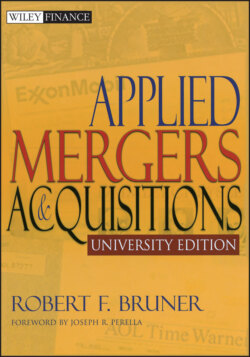Читать книгу Applied Mergers and Acquisitions - Robert F. Bruner - Страница 33
“Right” and “Wrong” Defined by Virtues
ОглавлениеFinally, a third tradition12 in philosophy argues that the debate over “values” is misplaced: The focus should be on virtues and the qualities of the actor. The attention to consequences or duty is fundamentally a focus on compliance. Instead, one should consider whether it is consistent with being a virtuous person. This view argues that personal happiness flows from being virtuous, and not merely from comfort (utility) or observance (duty). It acknowledges that vices are corrupting. And it focuses on personal pride: “If I take this action would I be proud of what I see in the mirror? If it were reported tomorrow in the newspaper, would I be proud of myself?” A journalist reported that this is the stance of Warren Buffett, CEO of Berkshire Hathaway and one of the most successful investors in modern history:
Every year, Buffett reminds his CEOs how important personal integrity is to him. “He sends out this letter, and the opening paragraph is always the same,” [manager Melvyn] Wolff says. “I’ve seen it enough times by now that I’ve got it memorized: ‘We can afford to lose money. We can afford to lose a lot of money. But we cannot afford to lose one shred of our reputation. Make sure everything you do can be reported on the front page of your local newspaper written by an unfriendly, but intelligent reporter.’ Those comments were written long before the recent corporate scandals.”13
In the gray areas of business ethics, rules can be faulty guides; one might gain clearer guidance from reasoning what a person of character would do.
Critics of virtue-based ethics raise two objections. First, a virtue to one person may be a vice to another. Solomon (1999) points out that Confucius and Friedrich Nietzsche, two other virtue ethicists, held radically different visions of virtue: Confucius extolled virtues such as respect and piety. In contrast, Nietzsche extolled risk taking, war making, and ingenuity. Thus, virtue ethics may be context-specific. Second, virtues can change over time. What may have been regarded as gentlemanly behavior (i.e., formal politeness) in the nineteenth century might have been seen by feminists in the late twentieth century as insincere and manipulative.
Discrete definition of “right” and “wrong” remains a subject of ongoing discourse. But the practical person can abstract from these and other perspectives useful guidelines toward ethical work:
How will my action affect others? What are the consequences?
What are my motives and my duty here? How does this decision affect them?
Does this action serve the best that I can be?
